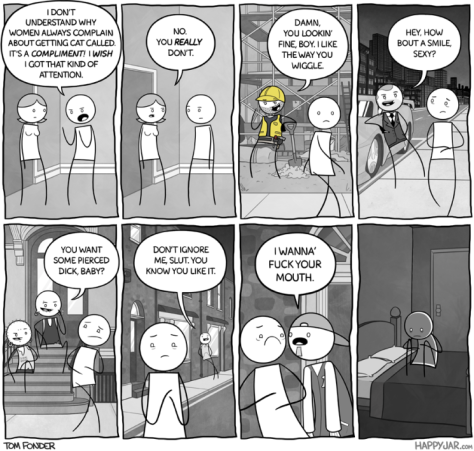When I was preparing to study abroad in Egypt, I was warned by many well-meaning friends and family that they do not treat women well there, that women are harassed on the streets every day. I was told to buy a wedding band so people would think I was married, to never walk alone, to do all these things to save me from the patriarchal culture.

I didn’t have a single experience of harassment while I was in Egypt (though the circumstances in January-February 2011 obviously weren’t the norm in Cairo, nor what I planned for, I was still always treated with respect).
However, the harassment I was warned about—cat-calls, whistles, general disrespect—is not at all foreign to me or the women I know. I grew up experiencing these things in Salt Lake City and its suburbs; I experienced it as an adult in Portland; and now as a 28 year old woman I still get it here in Utah. The most common incident, in my experience, occurs when I am walking down the street—the time of day, what I am wearing, all of that is irrelevant. I’ll just be minding my own business when a car drives by, a head pops out a window, and a whoop, whistle, meow, or inappropriate remark is flung at me, a perfect stranger.
I remember talking to my friends when we were 14-15 years old about how we handle it: giving the harasser the finger, cursing at him, just ignoring him. We argued about what was the best way to assert our right to respect. The truth is, especially in these drive-by assaults, there is absolutely NOTHING the woman, girl, or even unfortunate guy who is receiving harassment can do to impact the situation. We are completely powerless. And perhaps that’s the point.
I have spoken to guys (and women) about these experiences, and I get a variety of responses, but two more often than others. The first category consists of people who say “boys will be boys, at least they’re not actually hurting you.” Then there is the second group: guys who are shocked into disbelief because they have never witnesses this kind of behavior.
To the first group, I say this: Imagine a perfect stranger treating you like a prostitute, and not giving you an inch of opportunity to make him feel bad for it. If it happened just once—who cares. He doesn’t know you. But now imagine that experience on repeat. Several times a week, starting when you’re a tween and throughout your adulthood. Different men calling out to you like they own you. Compound that with everything in your culture saying your value lies first and foremost in being attractive. Then when someone acts like they have a right to your body—even just to call out to it from a car—you have no power to say otherwise. Sure, you can brush it off, tell yourself it doesn’t mean anything. I do this every time it happens. But if you don’t think it adds up, you’re in denial. Imagine your daughter or sister being put in this powerless situation on a regular basis. How many times a month, a week, a day would she need to be subjected to harassment before you think it will start to impact how she feels in public spaces? Before it will impact her self-image? Before it changes what value she thinks others see in her? Dealing with this BS simply becomes part of what it is to be female, whether we like it, or even acknowledge it, or not.

To the second group—guys who are shocked that this experience is so common—I totally get it. I have never had this experience while hanging out with guy friends or male significant others in public spaces. So if it doesn’t happen to girls accompanied by guys, how would guys witness it happening? Unless of course you’re the one doing it, or sitting next to the juvenile a-hole in the car. But if you fit into this category, chances are you never hung out with these kinds of people, nor were the kind of friend that would laugh at and encourage this immature posturing in your friends. Since I have been married (nearly 4 years), I have decided to tell my partner about each incident I experience—and every single time, he is absolutely shocked. How could this be happening as I walk down the street in our safe suburban neighborhood in the middle of the day? Who are these people? What kind of society do we live in? He gets furious every time, and it’s almost enough to make me not want to tell him anymore. Afterall, I’ve been dealing with this behavior my whole life. The only way to deal with it, being completely powerless each time it happens, has been to not get too worked up about it. But maybe he’s right.
Yesterday he said to me, “How can men be allies if we have so little exposure to the problem that we can’t come close to grasping its magnitude?” Great point. That’s why I am writing this blog. And why I will continue to tell him about my experiences. Because face it ladies, we need guys if we’re ever going to assert our right to respect. Just like they need us as they commence their journey of defining what it is to be a man and/or human. We need them not just because they aren’t completely desensitized to the issue and can breath new fire into it, as my partner is doing, but also because there is only one group of people who can make the drive-by perpetrators of harassment feel shame: the buddies who are in the car with them.
So what can guys (and gals) do to bring shame to this behavior?
- Stay aware of what is happening in our communities.
- Teach our kids which behaviors are evidence of a strong, smart, impressive person; and which are evidence of slowed maturity and an inability to grow up and become a “real man,” or just a mature human being.
- Then teach our kids to stand up for these values, and by doing so help their friends to not succumb to primitive tendencies that not only dehumanize their targets, but dehumanize themselves.
- Walk the talk. Part of teaching anyone to stand up for their values is doing it yourself. If your friends say/do something disrespectful, say something. Don’t grow a tail and stick it between your legs.
- Discuss with friends and family the fact that anyone who is treating others like a dog is necessarily acting like a dog him/herself.*
And ladies, speak up. Maybe you can’t say anything to the drive-by a-hole that will do anything other than make him laugh, but you can help the men/boys in your life be more aware of the world we are all living in. In doing so, you’re helping them be better friends, brothers, fathers, partners, and allies.
We’ve all heard the cliché, “Every man is an island.” And it’s true. We are all, to some degree, limited to our own experiences and interpretations of the world around us. But every island is connected by a vast ocean—an ocean that ebbs and flows, pulling and sharing the nutrients and poisons every landmass has to offer. We can’t avoid impacting and being impacted by the people and things we encounter. But if we pay enough attention to the life that flows around us, the people passing through, and the ripples we ourselves cause, we can enrich our communities and ultimately humanity as a whole. Saying we want clean oceans isn’t enough. We have to admit that we are living in the middle and are a part of it, too.

*I love dogs, but this is a useful idiom. Especially if you’ve ever seen half-wild, in-tact male dogs around a female in heat.
